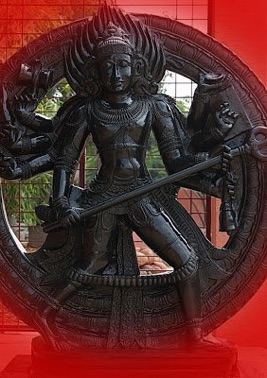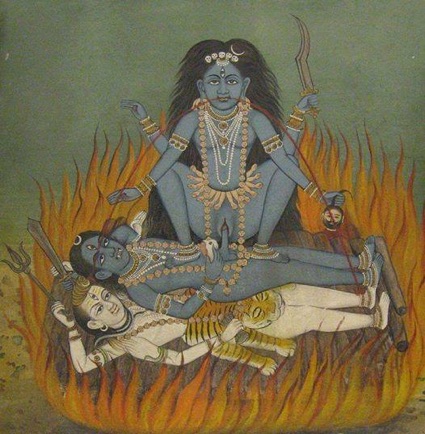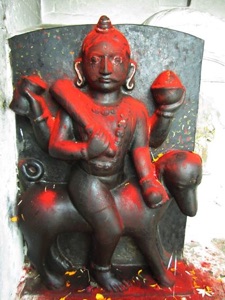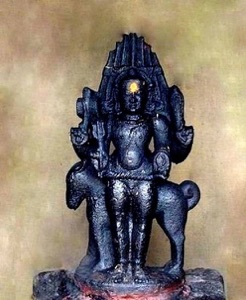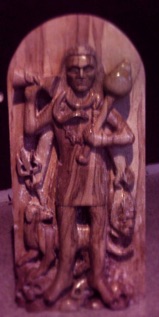Sri Kalbhairav

Sri Kalbhairav
kala bhairava was a mendicant(beggar) with a begging bowl in hand. the begging bowl was not just any vessel. it was the skull of brahma's fifth head. Lord shiva cut it off to humble brahma and vishnu. This story here relates to the earlier post 'The origin of Brahma and vishnu' that i posted a few days ago. ee kalabhairavudine manam mudduga aadi bhikshuvu ani antaamu. so here goes the story: Brahmâ and Vishnu were disputing with each other for the status of supreme God and appealed to the testimony of the four Vedas, which unanimously proclaimed Rudra-Shiva as the Ultimate Truth of the Universe. But the disputants were unable to accept that Rudra, endowed with so many revolting symbols of impurity and degradation, could be identical with the Absolute Reality of Brahman. Brahmâ laughed scornfully: "How could the Brahman, free of all attachment, lustily sport with his wife in the company of his troop of deformed churn-goblins (pramatha)?" However, Rudra's supremacy was finally reconfirmed by the esoteric sound-syllable, Omkâra, quintessence of the Veda and most condensed symbol of Brahman, who pointed out that Shiva's wife is not adventitious to her husband but on the contrary embodies his own blissful essence. Just then an immense pillar of flame manifested itself in their midst, within which was recognized the towering figure of the three-eyed Rudra bearing his trident, serpents and crescent moon. But the fifth head of Brahmâ taunted him: "I know who you are, Rudra, whom I created from my forehead. Take refuge with me and I will protect you, my son!" Overflowing with anger, Shiva created a blazing Bhairava in human form, addressing this Kâlabhairava as "Lord of Time-Death" (kâla) for he shone like the god of Death: "You are called Bhairava because you are of terrifying features and are capable of supporting the universe. You are called Kâla-Bhairava, for even Time-Death is terrified of you." He ordered him to chastise Brahmâ, promising him in return eternal suzerainty over his city of Kâshî (Vârânasî), the cremation-ground of the Hindu universe, where final emancipation is assured. In a trice, Bhairava ripped off Brahmâ's guilty head with the nail of his left thumb. Seeing this, the terrified Vishnu eulogized Shiva and devotedly recited his sacred hymns, followed in this by the repentant Brahmâ. Thereby they gained his protection by realizing and acknowledging the supreme reality of Shiva. The severed head immediately stuck to Bhairava's hand, where it remained in the form of the skull, destined to serve as his insatiable begging-bowl.Enjoining him to honor Vishnu and Brahmâ, Shiva then directed Bhairava to roam the world in this beggarly condition to atone for the sin of Brahmanicide. "Show to the world the rite of expiation for removing the sin of Brahmanicide. Beg for alms by resorting to the penitential rite of the skull (kapâlavrata)." Creating a maiden renowned as 'Brahmanicide' (brahmahatyâ), Shiva instructed her to relentlessly follow Bhairava everywhere until he reached the holy city of Kâshî to which she would have no access. Observing the Kâpâlika rite with skull in hand and pursued by the terrible Brahmahatyâ, Bhairava sported freely, laughing, singing and dancing with his goblin horde (pramathas). Stealing more than the hearts of all women, even the chaste wives of the Seven Vedic Sages (sapta-rshi) as he passed through the Daru forest, the erotic ascetic arrived at Vishnu's door to seek redemption only to find his entry barred by the guard, Vishvaksena. Spearing the latter and heaving the corpse of this Brahman on his shoulder, he pressed before Vishnu with outstretched begging-bowl. Vishnu split his own forehead-vein (see pic 2) but the out-flowing blood, the only suitable offering, could not fill the skull though it flowed for eons. When Vishnu then tried to dissuade Brahmahatyâ from tormenting Bhairava, the criminal observed that "beggars are not intoxicated by the alms they receive as (are others) by drinking the wine of worldly honor." Vishnu venerated him as the Supreme Being, untainted by sins like Brahmanicide, and acknowledged that his dependence and degradation were a mere fancy. Before leaving joyously to beg elsewhere, Bhairava reciprocated by recognizing Vishnu as his foremost disciple and acknowledged the latter's status as "grantor of boons to all the gods." On arriving at Kâshî, Brahmahatyâ sank into the nether-world, and the holy ground on which the skull fell, freeing Bhairava from his Brahmanicide, came to be known as Kapâlamocana. It was on the eighth day (ashtamî) in the dark (waning moon) half of the month of Mârgashîrsha that Lord Shiva manifested himself as Bhairava. Ever since, by performing ablution at Kapâlamocana one is rid of even the worst sin of brahmanicide (brahmahatyâ); and whosoever fasts on this day (Bhairavâshtamî) in front of Kâlabhairava (temple at Kâshî) and stays awake at night is freed from great sins. The original Kâla Bhairava temple was located on the banks of the Kapâlamocana Tîrtha itself, in the Omkâreshvara area north of Maidâgin in Vâranasî, where Bhairava remained as the 'Sin-Eater' (Pâpa-Bhakshana) par excellence to devour the accumulated sins of devotees and pilgrims. If the pilgrims to Kâshî do not fear death there, this would be because their pilgrimage to the Mahâshmashâna is conceived on the ritual model of Bhairava's own arrival at Kâshî for absolution from his terrible sin and his subsequent establishment there. The paradox of Bhairava's scapegoat function even after his 'purification' can be explained as a 'lawful irregularity' resulting from the two opposing valorizations, diachronically disjoined in the myth, of his transgressive essence; it matches the complementary paradox of the pure Kâshî-Vishvanâtha himself being identified esoterically with the impure criminal Bhairava.
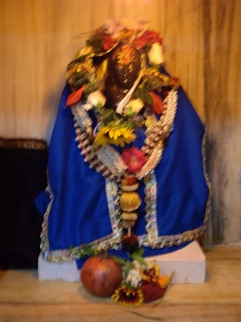









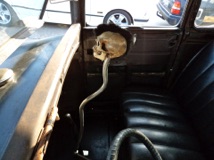
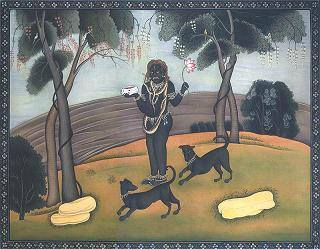
ĀTH KĀLBHAIRAVASTAKAM
Devrāj sevyamān pavanamghri pankajam
vyāl yagya sutramindu shekaram kripākaram
Nārdādi yogivrinda varditam digambaram
Kāshikā purādināth kālbhēravan bhaje
Bhānukoti bhasvaram bhavabdhitārakam paran
nilkanthamispitārtha dayakam trilochanam
Kālkāl mambujakshamaksha shulamaksharan
Kāshikā purādināth kālbhēravan bhaje
Shultank pāshadand pānimādi jkārnam
shyāmkaya mādideva maksharan nirāmayam
Bhīmvikraman prabhum vichitra tāndavpriyam
Kāshikā purādināth kālbhēravan bhaje
Bhukti mukti dayakam vashast charu vigraham
bhaktavatsalan sthitan samastalok vigraham
Vivik-vanan-manogya him kinkani lasatkatim
Kāshikā purādināth kālbhēravan bhaje
Dharmasetupalakan tvadharm mārganashakan
karmapash mochakan sukarm dayakan vibhum
Svarn varn shes pasha-shobhitang mandalam
Kāshikā purādināth kālbhēravan bhaje
Ratnapāduka prabhabhirampad yugmakam
nityamaditiyamistadevatan niranjanam
Mrityu darp nashanan karal dastramokshanan
Kāshikā purādināth kālbhēravan bhaje
Ātthas bhinnpadma jandkosta santatim
dristipat nastpap jal mugrashāsanam
Āsthasiddhi dāyakam kapalamalikadharam
Kāshikā purādināth kālbhēravan bhaje
Kālbhērav vastakan patamti ye manoharam
gyān mukti sadanan vichitrapunyavardhanam
Shok moh denya lokh koptap nashanan
te pryanti kālbhēravan grisannidin druvam
"The Kalabhairavastam” (translation)
I sing praises of Kalabhairav, who is the ruler of Kashi
Whose lotus feet are served by Indra
Who wears the sacred thread of Naga
Who has moon on his forehead
Who is the abode of mercy
Whose clothes are the directions
Who is worshipped by sages like Narada.
I sing praises of Kalabhairav, who is the ruler of Kashi
Who shines like a million suns
Who absolves the ocean of cycle of rebirth
Who is supreme and has a blue neck
Who bestows us with our desires,
Who has three lotus like eyes
Who is the end of Kala,
who has immortal weapon and Who is immortal.
I sing praises of Kalabhairav, who is the ruler of Kashi
Who has a spear, a chord and a stick as weapons,
Who is the cause behind the beginning,
who has a grey (smeared ) body,
Who is the first Deva, Who is imperishable,
Who is free from decay and illhealth
Who is immensely mighty,
who is the Lord and who loves the vigorous Tandava.
I sing praises of Kalabhairav, who is the ruler of Kashi
Who is the bestower of desires and salvation
Who has an enticing appearance and form
Who endears his devotees,
Who is static and also assumes various forms,
Who has a golden waist thread with small melodious bells.
I sing praises of Kalabhairav, who is the ruler of Kashi
Who is the maintainer of righteousness and the destroyer of unrighteous paths
Who liberates us from the ties of Karma
Who makes us ashamed when trying to do wrong things,
Who has a shining body decorated with golden chords.
I sing praises of Kalabhairav, who is the ruler of Kashi
Who has feet adorned by gold sandals adorned by gems,
Who is eternal, who is induplicable,
Who has no desires but bestows all our desires,
Who destroys the fear of death and Who liberates the souls by his teeth.
I sing praises of Kalabhairav, who is the ruler of Kashi
Whose roar is loud enough to destroy all the manifestations created by the Lotus- Born Brahma,
Whose merciful glace is enough to destroy all sins,
Who is the powerful ruler who gives the Eight Siddhis
Who wears the garland of skulls.
I sing praises of Kalabhairav, who is the ruler of Kashi
Who is the leader of Ghosts and Spirits,
Who showers immense glor,
Who absolves people dwelling in Kashi from their sins
Who is an expert in the way of righteousness
Who is eternally old and controller of universe
Those who recite these eight verses on Kalabhairav,
Which is the source of eternal knowledge,
Which increases the effect of righteous deeds,
Which destroys grief, passion, poverty, want and anger,
Would surely move towards the presence of Kalabhairav.

